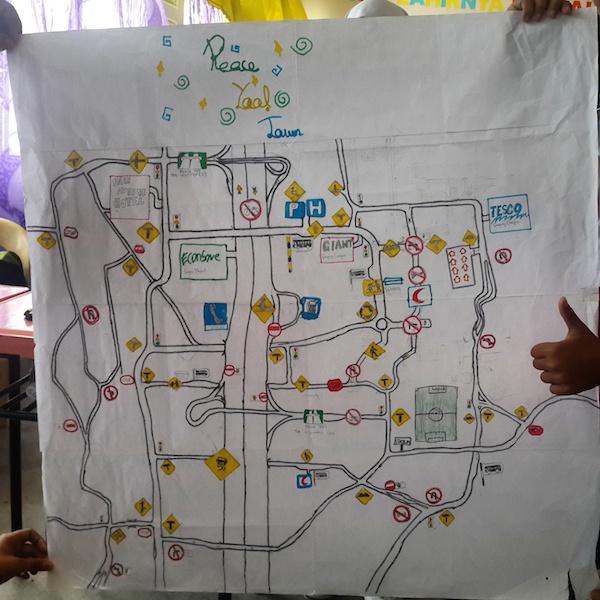"Excuse me, professor, how many pages should our assignment be?"
 I had almost predicted the question before I saw my coursemate putting up her hand.
I had almost predicted the question before I saw my coursemate putting up her hand.
Of course, what else would we want to know when we are given an assignment? If it isn’t the number of pages, we’d probably want to know about the type of font to use or the spacing required.
From my undergraduate days till today, sitting in a doctorate class, the questions have remained the same. At times, it even goes as far as wondering how many paragraphs or sentences to put in a paragraph.
We want to know it all before starting an assignment. We need rules. We need limits. We need the exact number of pages and the font size. We need past year samples of assignments – only then will we be happy because we can guarantee ourselves that "A".
And this culture of wanting rules and limits goes right back to schools. When I give my class an assignment, the usual questions I get are: which book to use, what colour pen to use and how many lines do I want.
I often tell my students that I don’t care. I know I will be going against every teaching rule there is when I say that as long as I see them writing and thinking, I’m fine. As long as I see them learning, I’m happy. What does it matter if they are using a pink pen to write?
When I wanted to teach my Form One class how to give directions, I made them imagine their own towns and draw maps. One boy asked me: why do they have to create their own maps when they could photocopy it from the book and then learn how to give directions?
 What is the point then? Where is the learning if you’re going to photocopy something and paste it in your book? I insisted they draw their own maps and frankly, I was surprised at how well some of them drew their town plans. It was only after they had their town plans laid out that we learnt how to give directions.
What is the point then? Where is the learning if you’re going to photocopy something and paste it in your book? I insisted they draw their own maps and frankly, I was surprised at how well some of them drew their town plans. It was only after they had their town plans laid out that we learnt how to give directions.
We need to do away with restrictions and limits. We need our children to think. The font or number of pages only mean so much compared to the content and thought put into an assignment. If you walk into any school, even the most boisterous classes are quiet when they are given an assignment that requires them to copy from the board. It has become their favourite thing to do. They can copy essays and even memorise them and they will be very quiet and happy doing so. The noise and chaos only comes when we tell them to come up with something original.
We have trained our students to become users of knowledge and hardly ever creators of knowledge. We live in times where it is information overload yet we severely lack in wisdom. In the words of Sir Ken Robinson, "We have sold ourselves into a fast food model of education, and it's impoverishing our spirit and our energies as much as fast food is depleting our physical bodies."
We package education into bite-size, instant goodness where the end results are A's, a first-class degree, a doctorate – with no thinking involved. While teaching our students to be literate, we forget to teach them how to use the power of being literate to think, reason and wonder.
How can we move forward? Will our school pupils and undergraduates break free from limits and restrictions to think? Will we then punish them if they begin expressing their thoughts and ideas?
I know realistically, we still have a long way to go before we can proudly say our pupils are of world-class standards. At the same time, I also know that this is not an impossible dream. It can happen, from one teacher to another and then from one school to the next.
Sir Ken Robinson once said that when the classroom door closes, teachers must remember that they are the education system. It is then up to you to decide what kind of thinking and learning you want for your students.
I believe that instead of debating over which subjects should or should not be made a compulsory pass or what should or should not be taught in English, we need to worry about injecting creativity and thinking into all our subjects.
In the words of Alvin Toffler, "The illiterate of the 21st century will not be those who cannot read and write, but those who cannot learn, unlearn and relearn."
It only means so much if English is made a compulsory pass and we are still restricting our children’s thought process. It only means so much if we have Science and Maths in English yet our students have no idea how to apply the knowledge that they have gained.
The real question should be, can our education system create a generation of thinkers and learners? – September 24, 2015.
* This is the personal opinion of the writer or publication and does not necessarily represent the views of The Malaysian Insider.


Comments
Please refrain from nicknames or comments of a racist, sexist, personal, vulgar or derogatory nature, or you may risk being blocked from commenting in our website. We encourage commenters to use their real names as their username. As comments are moderated, they may not appear immediately or even on the same day you posted them. We also reserve the right to delete off-topic comments